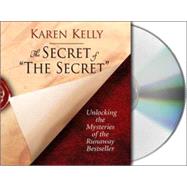Some of the revelations include:
· The Birth of the Secret: the story behind the creation of the book and the film
· Culture of Hope: what draws our culture to seek answers and change our destiny using the power of the mind and the universe
· The Ideas Behind the Secret: how do history, science, and religion play major roles as underpinnings of The Secret?
· The People Behind the Secret: From Beethoven and Shakespeare to Thomas Edison and Andrew Carnegie, their quotes pepper The Secret--who are these people and did they really use The Secret?








